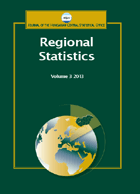The economic consequences of World War I and the
Treaty of Trianon for Hungary
The economic consequences of World War I and the
Treaty of Trianon for Hungary
Author(s): Béla TomkaSubject(s): History, Social Sciences, Economy, Geography, Regional studies
Published by: Központi Statisztikai Hivatal
Keywords: Peace Treaty of Trianon; economic growth; interwar Hungary; economic history
Summary/Abstract: Hungary's post-Trianon economic situation is still discussed selectively in the literature on the subject, and the same applies to wider public discourse. Contemporary Hungarian surveys of the economic effects of the Trianon Peace Treaty focus on the loss of natural resources, implicitly assuming that raw materials and other natural resources are the main drivers of economic growth. However, based on the traditional interpretation of Trianon's economic consequences, we cannot explain some basic facts of economic history.As the study demonstrates, Hungary's post-Trianon economic performance was not inferior in international comparison to the relative performance observed during the period of dualism. Thus, in the medium and long term,the peace treaty did not have nearly as negative an economic impact as is commonly proposed. One of the main reasons for this is that natural resources were no longer key determinants of economic growth between the two world wars, but rather were structural changes in the economy, technological advances, and human capital that were less affected by the peace treaty.
Journal: Regional Statistics
- Issue Year: 10/2020
- Issue No: 01
- Page Range: 82-100
- Page Count: 19
- Language: Hungarian

